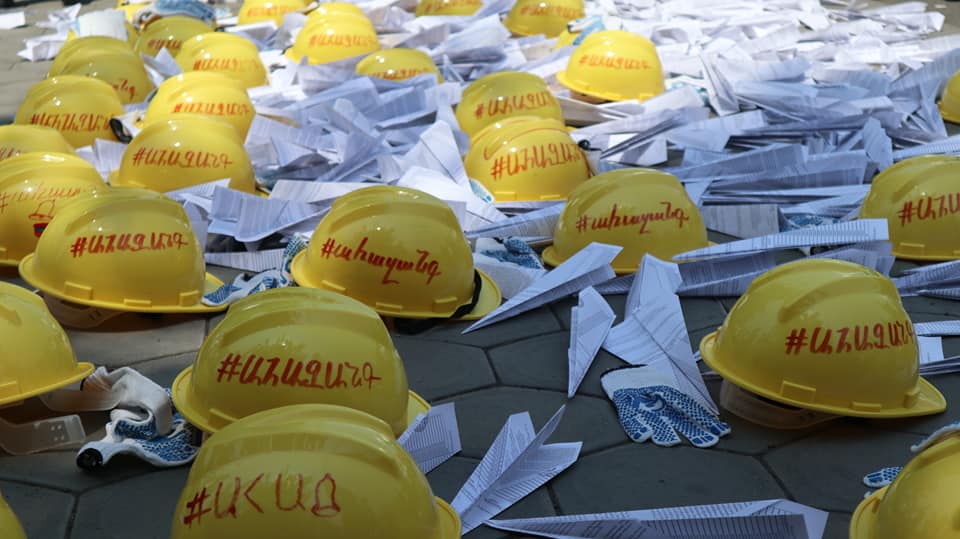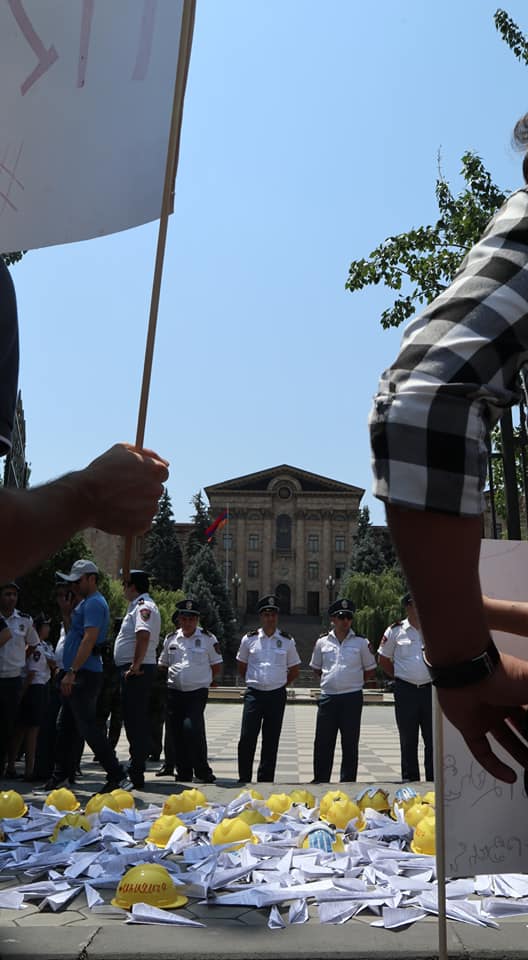
YEREVAN—Parliament has approved a controversial tax code overhaul package which would introduce a flat personal income tax rate, cut corporate taxes and provide preferential tax rates for startups and small businesses. MPs voted on the bill on Tuesday amid protests by the Armenian Revolutionary Federation’s (ARF) youth wing—the Armenian Youth Federation (AYF)—in the Armenian capital.
The government hopes the amended tax code would help boost the country’s economic productivity and simplify business operations while encouraging job creation. At the first reading in early June, Deputy Finance Minister Arman Poghosian touted the bill to sitting MPs, insisting that it would “turn Armenia into a more competitive export-oriented economy.” The Minister argued that export-oriented businesses, which are essential for the sustainable growth of small economies, had previously gotten the short end of the stick.
Deputy Minister Poghosian also said that the new tax code would encourage the growth of small and medium enterprises across the country. While the corporate tax rate will decrease from 20 percent to 18 percent, the revenue ceiling to qualify for a turnover tax (rather than profit and value added tax) would be raised to 115 million AMD ($240,000) in annual revenue. Additionally, small enterprises with an annual income under 24 million AMD ($50,000) registered outside of Yerevan will be exempt from all corporate taxes.
The provision to introduce a single flat income tax rate has garnered the most scorn from detractors. The current progressive income tax scheme categorizes salaried workers into three taxable income brackets. Workers earning under $300 pay a 23 percent tax. An additional 28 percent tax applies to income between $300 and $4000, while any income above that falls within the 36 percent tax bracket. The newly-approved tax code would collapse those brackets into a single 23 percent tax rate regardless of income to be reduced to 20 percent within the next three years.

The AYF’s Armenian branch has emerged as one of the most vocal critics of the flat tax. The organization argues that the new tax scheme would shift the budgetary burden away from the super-rich and onto the working poor. They further criticized the government’s initial proposal to compensate for lost revenue by raising the Value Added Tax (VAT) as an additional burden on the have-nots.
The AYF is accusing Prime Minister Nikol Pashinyan’s government of prioritizing economic growth at the expense of the lowest income earners. They point to the experiences of other Eastern European countries which have, in their opinion, not witnessed the “trickle-down” of economic benefits towards the worst-off. “We demand a comprehensive reform of the tax system that will first serve the most vulnerable of the society and not widen the growing abyss between economic classes,” said Arshak Mesrobian, a member of the alarm initiative.
While the AYF does see the need for tax reform, they suggest expanding the current progressive income tax system to include a fourth bracket. They also call for a 50 percent increase of minimum wage, which currently sits at 55 000 AMD ($115) per month.
Several dozen AYF members have launched a sit-in under the gates of the National Assembly to protest the adoption of a tax-code which they say “ignores the needs of the poor and relies heavily on the goodwill and word of the most financially stable of society.” Activists have launched a social media campaign in tandem with the sit-in dubbed “Ahazank” (Alarm) which, according to the AYF is designed to “combat not only these proposed changes but the growing misinformation in the country.”
The Prime Minister’s Office responded to the AYF’s apprehensions, in an official communiqué acknowledging some of the proposed tax law’s side effects. However, the letter defended the move, citing a World Bank study projecting a two percent decrease in poverty levels. Nevertheless, Pashinyan paid a visit to the protest-site on the second day of the sit-in where he listened to the activists’ concerns.
Economists disagree on whether progressive income tax systems do curtail inequality. At least one study of 21 countries in the Organization for Economic Cooperation and Development (OECD) found that progressive income tax increases inequality over the long term by slowing the rate of economic growth. This issue is even more apparent among countries with weaker state institutions.
In Armenia’s case at least, progressive taxation has had negligible success in curbing inequality, which—according to World Bank data—has grown by nearly 60 percent over the last decade. The culprit might be unequal tax collection rather than tax brackets. The International Monetary Fund has observed a disparity of as much as six percent in Armenia’s tax-to-GDP ratio, implying widespread tax evasion.
According to the Armenian Statistical Service, two in every three workers fall into the lowest taxable income bracket. Businesses have long been suspected of capping official salaries at 150,000 AMD, while paying out cash bonuses as a tax avoidance measure. The increasing popularity of off-shore tax havens among the highest income earners has also denied the state coffers of much-needed revenue.
Desire to reign in on the country’s substantial ‘shadow economy‘ at least partially motivates the government’s tax code overhaul. Pro-government MP Artak Manukian, who voted in favor of the bill, argued that a simplified tax code would eliminate opportunities for tax evasion and encourage businesses to reinvest revenues into the economy.
Opposition to the tax code amendment bill in Parliament has been spearheaded by the Prosperous Armenia Faction. Party Leader Gagik Tsarukyan explained his party’s intention to vote against the proposed legislation. “Increasing the budget at the expense of the people is not acceptable,” he said. As one of Armenia’s wealthiest men, Tsarukyan styles himself as a generous philanthropist; his companies, however, are currently under investigation on multiple accounts of tax fraud.
Pashinyan’s tax reform bill also faced pushback from within his own faction. Gayane Melkomian, a My Step member who sits on Yerevan’s Municipal Council wrote on Facebook: “There can be no love and solidarity without social justice” (referring to one of the proposed names for last year’s Velvet Revolution).
The bill has been amended between the first and second readings in order to mitigate potential negative effects on vulnerable members of society. The government has walked back its controversial proposal to increase the VAT. The amended bill instead raises the excise tax on alcohol and tobacco producers to compensate for any losses in personal income tax revenue. Taxes on gambling are also expected to rise to 20 percent. The new bill also introduces a five percent dividend tax for residents of Armenia.
The bill was passed into law despite some reservations this week with 73 voting in favor, while 32 members, mostly from the Prosperous Armenia and Bright Armenia parties voting against it. The new tax code will come into force on the first of January 2020.


This the best news out of Armenia!
A flat tax would treat people equally. A wealthy taxpayer with 1,000 times the taxable income of another taxpayer would pay 1,000 times more in taxes.
More importantly, it would reduce government power over the lives of taxpayers and get it out of the business of trying to micromanage the economy.
There will never be a tax that is good for the economy. But the flat tax moves the system much closer to where it should be – raising the revenues that government demands, but in the least destructive and least intrusive way possible. https://www.heritage.org/taxes/commentary/flat-tax-the-way-the-future
Economists overwhelmingly agree that progressive taxes in general and progressive income taxes in particular curtail inequality. The OECD working paper that Raffi mentioned discusses the effects of different types of taxes on economic growth. It doesn’t discuss inequality or distribution. There is no clear link between economic growth and inequality. Therefore, if higher income taxes slow down economic growth, inequality could go up or it could go down.
Let me quote from the conclusion of the OECS working paper “it should be noted that this paper analyses the effects of different taxes on economic growth, which may not be the only objective of tax policy design. The distributional effects of different taxes – an analysis of which is beyond the scope of this paper – may also influence tax policy design, so that one should not blindly equate growth-friendly with politically desirable.”
“Economists overwhelmingly agree that progressive taxes in general and progressive income taxes in particular curtail inequality. ” –> No they don’t, lol, if they did, they would be able to explain why California, New York, Connecticut and New Jersey have the highest inequality rates in the US, despite having the most advanced progressive tax rates!
Dear Taline, if California, New York, Connecticut and New Jersey didn’t have progressive income taxes, then inequality in those states would have been worse.
Dear Taline,
Without “advanced progressive tax rates”, California, New York, Connecticut and New Jersey would have higher inequality rates. Open any introductory economics textbook, which discusses taxation and you will see that progressive taxes address the equity concern of a tax system.